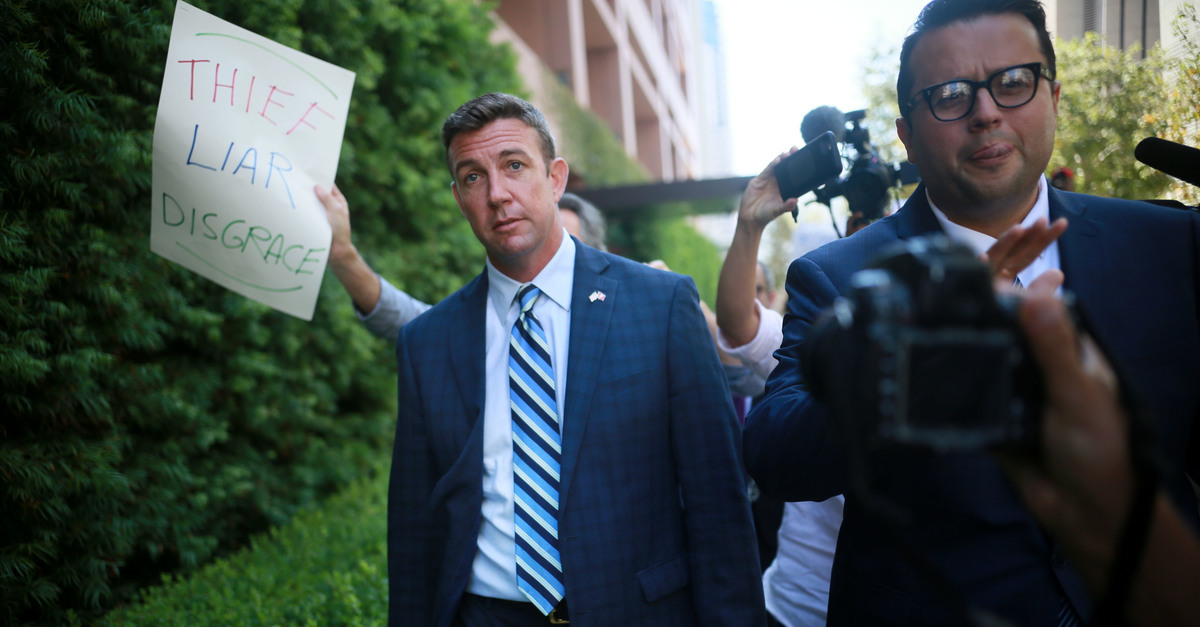
Indicted Rep. Duncan Hunter (R-California) is facing a new round of campaign finance fraud questions after filing federally-mandated forms which lacked required information about members of his own family.
According to the San Diego Union-Tribune, Hunter’s campaign reported multiple $2,700 contributions from Hunter’s uncle, James H. Hunter, earlier this year. Those federally-filed reports claimed that Rep. Hunter was unaware of and unable to ascertain both: (1) his uncle’s employer; and (2) his occupation.
James H. Hunter is an Idaho resident. Between himself and his wife, Jan Hunter, the Idaho Hunters have donated in excess of $67,000 to Rep. Hunter’s campaigns over the years. Information about the Hunter family business in Idaho is easily accessible via the Idaho Secretary of State’s website.
This week, the Federal Elections Commission (FEC) sent Hunter’s campaign treasurer a letter noting that “information requested per best efforts” is an unacceptable answer for questions concerning a donor’s occupation and employer.
That information was not simply missing for Hunter’s uncle. Over the past decade, Rep. Hunter failed to provide the required information on over 90 such donors, according to an extensive analysis of FEC records by the Union-Tribune‘s Morgan Cook.
Cook’s report notes, “six top-level executives for defense contractor Cubic Corporation … contributed a combined $3,250 to Hunter’s campaign on the same day, March 28, 2016.”
The day after those contributions hit Rep. Hunter’s campaign bank account–March 29, 2016–Cubic was awarded a “three-year, $2.3 million contract from the U.S. Army’s Maneuver Center of Excellence (MCoE) Clarke Simulation Center at Fort Benning, Georgia, to support Live, Virtual, Constructive and Game-based (LVCG) training for mission command systems,” according to a press release from the contractor.
The FEC is requesting that Hunter’s campaign amend their filings to add the occupational information or two document the so-called “best efforts” employed by the campaign to obtain the missing information.
Brett Kappel is an expert in campaign finance laws and ethical rules who works at the D.C. law firm Akerman LLP. In comments to the Union-Tribune, he clarified why the rules allegedly broken the Hunter campaign are so important. Kappel said:
The occupation and employer information is very important to identify which special interests are supporting a candidate. If twelve people from the same company give the same amount on the same day, it’s fair to infer that the company supports the candidate by either holding a fundraiser for him or attending one. In some cases, the occupation may be a clue that company employees may have been reimbursed for their contributions — not many busboys make $1,000 contributions. Without the occupation and employer information, the voters are left in the dark.
Kappel also noted the relatively low standard Hunter’s campaign would have to meet to satisfy the administrative agency’s critics. If the campaign can show they made two attempts to collect the information–regardless of the donor response to such inquiries–then Hunter is likely in clear, according to Kappel.
In response to the Union-Tribune‘s story, Hunter campaign spokesperson Michael Harrison issued the following statement:
Congressman Hunter and his campaign complies with all FEC requirements and regulations as it concerns the reporting of contributions and will continue to do so.
Rep. Hunter and his current wife and former campaign manager, Margaret Hunter, were indicted on charges of conspiracy, wire fraud, prohibited use of campaign funds and falsification of campaign finance records in August by Trump-appointed U.S. Attorney Adam Braverman. Those charges were initially based on a similarly off-kilter campaign finance filing.
Hunter has come under harsh criticism in his conservative-leaning congressional district for blaming those legal problems on his wife’s allegedly poor financial stewardship.
[Image via Sandy Huffaker/Getty Images]
Follow Colin Kalmbacher on Twitter: @colinkalmbacher